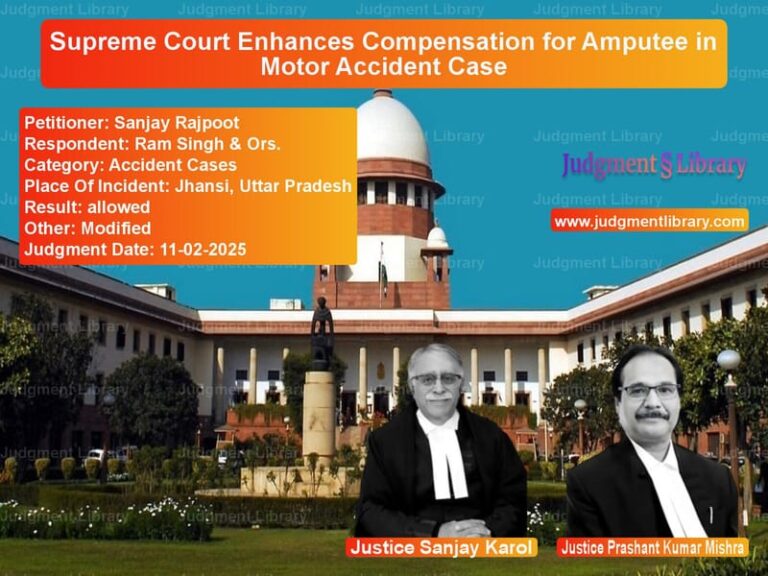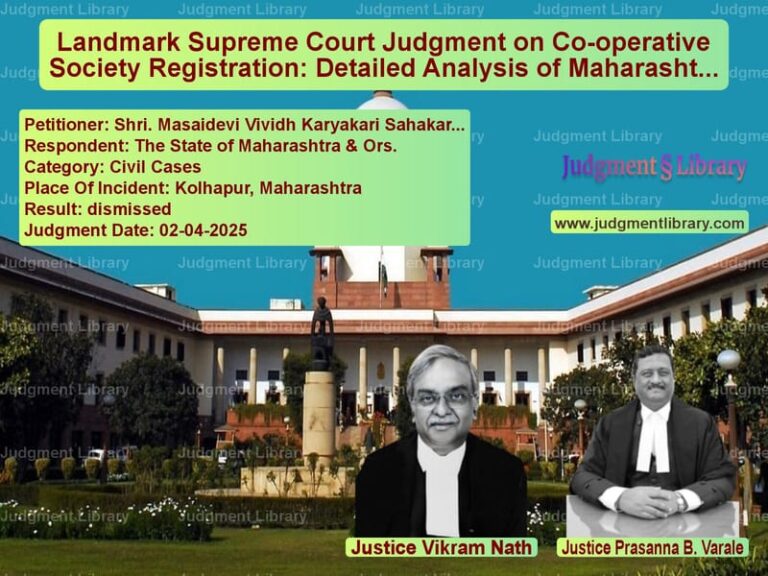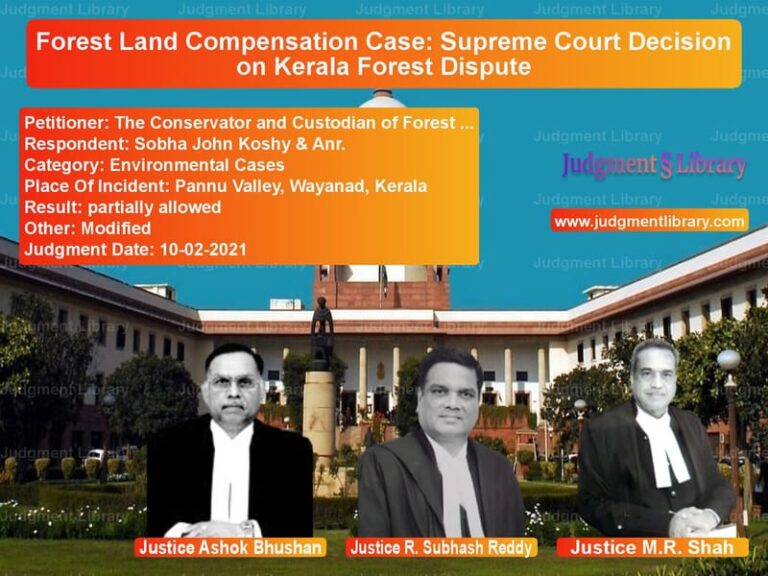SC/ST Act Case Quashed: Supreme Court Upholds Compromise in Ramawatar v. State of Madhya Pradesh
The Supreme Court of India recently delivered a significant judgment in Ramawatar v. State of Madhya Pradesh, which revolved around a long-standing legal dispute under the Scheduled Castes and Scheduled Tribes (Prevention of Atrocities) Act, 1989 (SC/ST Act). The case addressed the issue of caste-based abuse allegedly committed during a property dispute and the subsequent conviction of the accused. The primary focus of the ruling was whether a criminal proceeding under the SC/ST Act could be quashed based on a compromise between the accused and the complainant.
Background of the Case
The case arose from a civil dispute over a piece of land between the appellant, Ramawatar, and his neighbor, Prembai. On June 25, 1994, the appellant allegedly threw a brick at the complainant and verbally abused her with caste-based slurs. Following this incident, the complainant lodged an FIR at the police station under Section 3(1)(x) of the SC/ST Act along with Section 34 of the Indian Penal Code (IPC).
The trial court found the appellant guilty under the SC/ST Act and sentenced him to six months of rigorous imprisonment and a fine of Rs. 1,000. The conviction was upheld by the Madhya Pradesh High Court. Dissatisfied with the ruling, the appellant approached the Supreme Court, seeking relief on the basis of a compromise reached with the complainant.
Legal Issues Examined
- Whether a criminal case under the SC/ST Act can be quashed based on a compromise.
- Whether the alleged abuse was committed solely due to the complainant’s caste or arose from a personal property dispute.
- Whether the Court should exercise its powers under Article 142 of the Constitution to quash criminal proceedings.
Petitioner’s (Ramawatar’s) Arguments
The appellant, represented by counsel, argued that:
- The dispute was a private property issue and not an offense committed on account of caste discrimination.
- The complainant had willingly entered into a settlement with the appellant, and both parties wished to maintain cordial relations.
- There was no premeditated intention to insult or humiliate the complainant due to her caste.
- Given the settlement, the Court should exercise its extraordinary powers under Article 142 to quash the criminal proceedings.
Respondent’s (State of Madhya Pradesh) Arguments
The prosecution, representing the State of Madhya Pradesh, contended that:
- The appellant’s conviction was based on a well-established case supported by credible evidence.
- The SC/ST Act was enacted to protect marginalized communities, and quashing the conviction could set a dangerous precedent.
- The offense in question was non-compoundable under Section 320 of the Code of Criminal Procedure (CrPC), and hence, the compromise was legally irrelevant.
- Conviction under the SC/ST Act should not be quashed merely on the basis of a settlement between the parties.
Supreme Court’s Observations
Scope of Article 142
The Court extensively analyzed the powers under Article 142 of the Constitution, stating:
“The jurisdiction of this Court under Article 142 can be invoked to quash a criminal proceeding on the basis of a voluntary compromise between the complainant/victim and the accused.”
Nature of the Offense
The Court examined whether the offense was committed solely due to the complainant’s caste or if it stemmed from a personal dispute. The ruling stated:
“The genesis of the incident was a property dispute, and there is no conclusive evidence that the alleged abuses were intended solely to demean the complainant on account of her caste.”
Compromise and Its Validity
The Court acknowledged that the complainant had entered into a compromise without coercion or pressure. It noted:
“Since both parties have amicably settled their dispute and wish to move forward in harmony, it would be appropriate to quash the proceedings in order to uphold social peace.”
Final Judgment
The Supreme Court allowed the appeal and quashed the conviction, making the following key determinations:
- The SC/ST Act is meant to deter caste-based atrocities, but its application should not be extended to cases where the primary motive was a personal dispute.
- Since the complainant and the accused had resolved their differences voluntarily, continuing the case would not serve the ends of justice.
- The Court’s power under Article 142 allows it to quash proceedings where the compromise does not harm the broader objectives of the law.
- The Court clarified that this ruling is limited to cases where the alleged offense is not a heinous crime but rather a private dispute.
Significance of the Judgment
This ruling has far-reaching implications:
- It establishes that the SC/ST Act should not be misused in cases where caste discrimination is not the primary motive.
- It sets a precedent for quashing criminal cases based on amicable settlements where the offense is not heinous in nature.
- It reinforces the judiciary’s power to ensure that justice is served without unnecessarily prolonging litigation.
- It provides clarity on the limited applicability of the SC/ST Act in property disputes.
By invoking Article 142, the Supreme Court has struck a balance between upholding the dignity of marginalized communities and preventing the misuse of special legislation for personal conflicts. This judgment is expected to serve as a guiding principle in future cases involving similar legal complexities.
Petitioner Name: Ramawatar.Respondent Name: State of Madhya Pradesh.Judgment By: Justice N.V. Ramana, Justice Surya Kant, Justice Hima Kohli.Place Of Incident: Madhya Pradesh.Judgment Date: 25-10-2021.
Don’t miss out on the full details! Download the complete judgment in PDF format below and gain valuable insights instantly!
Download Judgment: ramawatar-vs-state-of-madhya-prad-supreme-court-of-india-judgment-dated-25-10-2021.pdf
Directly Download Judgment: Directly download this Judgment
See all petitions in SC/ST Act Case
See all petitions in Property Disputes
See all petitions in Legal Malpractice
See all petitions in Judgment by N.V. Ramana
See all petitions in Judgment by Surya Kant
See all petitions in Judgment by Hima Kohli
See all petitions in allowed
See all petitions in Quashed
See all petitions in supreme court of India judgments October 2021
See all petitions in 2021 judgments
See all posts in Criminal Cases Category
See all allowed petitions in Criminal Cases Category
See all Dismissed petitions in Criminal Cases Category
See all partially allowed petitions in Criminal Cases Category







